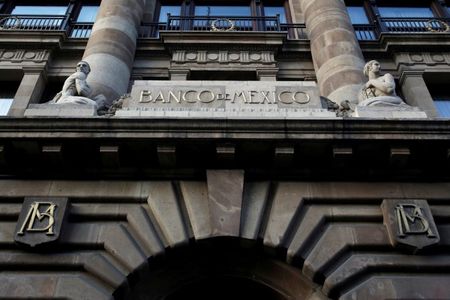By Marcela Ayres
WASHINGTON (Reuters) – Bank of Mexico Deputy Governor Jonathan Heath said on Friday the benchmark interest rate is likely to remain unchanged for longer than expected by markets, noting it would likely stay put at 11% at the May policy meeting and that the June decision would be data dependent.
Speaking to Reuters on the sidelines of the International Monetary Fund and World Bank spring meetings, Heath underscored the importance of waiting until service sector inflation demonstrates a clear downward trajectory, suggesting the possibility of two to four rate cuts this year depending on evolving economic conditions.
“Either we meet our inflation target and maybe we could cut, or we don’t meet our inflation target and we don’t cut,” Heath said.
Mexico’s headline inflation rate has sped up after bottoming out at 4.26% in October and remains above the Bank of Mexico’s target of 3%, plus or minus a percentage point.
“Inflation is stuck there, so we need to definitely be more persistent in our policy terms and try and break this kind of inertia that we’re looking at right now,” Heath said.
The monetary authority’s decision to lower the rate in March by 25 basis points from 11.25% was more “a fine-tuning” and not necessarily the start of a rate-cutting cycle, he said.
Heath said the board was “scared” it could be cutting rates prematurely, and would rather be cautious by waiting for inflation to come down first.
“The most important factors right now in terms of explaining the inflation persistence is the tight labor market with relatively strong wage increases,” Heath said, adding that government spending had made the job of bringing inflation down more difficult.
Mexico’s Deputy Finance Minister Gabriel Yorio on Thursday denied that public spending was pressuring inflation. President Andres Manuel Lopez Obrador’s administration has pushed to wrap up several projects before his term ends later this year.
The second half of this year should be “more favorable” in bringing down inflation after the government infrastructure projects are completed and elections are held in June, Heath said.
Ruling party candidate Claudia Sheinbaum is expected to win the presidential vote by a wide margin.
Elections in the United States could also affect Mexico, Heath said, particularly if former President Donald Trump, a Republican, beats current President Joe Biden.
Heath added that a Trump victory could put private investment in Mexico at risk as the renegotiation of the U.S.-Mexico-Candada (USMCA) free trade agreement is set to come up.
Trump’s 2016 victory caused the peso to drop sharply against the U.S. dollar, though a Trump victory in 2024 could cause a less-significant weakening, Heath said. “We know that he has a very large bark, and he bites, but not that much.”
The peso, one of the most-traded global currencies, had appreciated to its strongest level in nearly nine years last week to around 16.26 per dollar. It had weakened to 17.13 pesos per dollar by midday Friday.
“It’s good that (the peso has) gone back up a little bit,” Heath said, adding the currency would likely go back to a “more sustainable rate” of around 17 pesos per dollar.
(Reporting by Marcela Ayres; Writing by Kylie Madry; Editing by Anthony Esposito, Brendan O’Boyle and Bill Berkrot)





